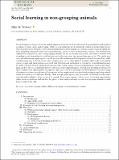Files in this item
Social learning in non-grouping animals
Item metadata
| dc.contributor.author | Webster, Mike M. | |
| dc.date.accessioned | 2023-03-30T10:30:11Z | |
| dc.date.available | 2023-03-30T10:30:11Z | |
| dc.date.issued | 2023-08-01 | |
| dc.identifier | 283897339 | |
| dc.identifier | 8e51be30-ad7f-4be6-b25c-cfa3beabe61f | |
| dc.identifier | 85152028817 | |
| dc.identifier.citation | Webster , M M 2023 , ' Social learning in non-grouping animals ' , Biological Reviews , vol. 98 , no. 4 , pp. 1329-1344 . https://doi.org/10.1111/brv.12954 | en |
| dc.identifier.issn | 1464-7931 | |
| dc.identifier.other | ORCID: /0000-0001-9597-6871/work/132214379 | |
| dc.identifier.uri | https://hdl.handle.net/10023/27297 | |
| dc.description.abstract | Social learning is widespread in the animal kingdom and is involved in behaviours from navigation and predator avoidance to mate choice and foraging. While social learning has been extensively studied in group-living species, this article presents a literature review demonstrating that social learning is also seen in a range of non-grouping animals, including arthropods, fishes and tetrapod groups, and in a variety of behavioural contexts. We should not be surprised by this pattern, since non-grouping animals are not necessarily non-social, and stand to benefit from attending to and responding to social information in the same ways that group-living species do. The article goes on to ask what non-grouping species can tell us about the evolution and development of social learning. First, while social learning may be based on the same cognitive processes as other kinds of learning, albeit with social stimuli, sensory organs and brain regions associated with detection and motivation to respond to social information may be under selection. Non-grouping species may provide useful comparison taxa in phylogenetic analyses investigating if and how the social environment drives selection on these input channels. Second, non-grouping species may be ideal candidates for exploring how ontogenetic experience of social cues shapes the development of social learning, allowing researchers to avoid some of the negative welfare implications associated with raising group-living animals under restricted social conditions. Finally, while non-grouping species may be capable of learning socially under experimental conditions, there is a need to consider how non-grouping restricts access to learning opportunities under natural conditions and whether this places a functional constraint on what non-grouping animals actually learn socially in the wild. | |
| dc.format.extent | 16 | |
| dc.format.extent | 409565 | |
| dc.language.iso | eng | |
| dc.relation.ispartof | Biological Reviews | en |
| dc.subject | Associative learning | en |
| dc.subject | Culture | en |
| dc.subject | Diffusion | en |
| dc.subject | Grouping | en |
| dc.subject | Social information | en |
| dc.subject | Sociality | en |
| dc.subject | QL Zoology | en |
| dc.subject | T-NDAS | en |
| dc.subject | MCC | en |
| dc.subject.lcc | QL | en |
| dc.title | Social learning in non-grouping animals | en |
| dc.type | Journal article | en |
| dc.contributor.institution | University of St Andrews. Centre for Biological Diversity | en |
| dc.contributor.institution | University of St Andrews. Institute of Behavioural and Neural Sciences | en |
| dc.contributor.institution | University of St Andrews. Centre for Social Learning & Cognitive Evolution | en |
| dc.contributor.institution | University of St Andrews. School of Biology | en |
| dc.identifier.doi | 10.1111/brv.12954 | |
| dc.description.status | Peer reviewed | en |
This item appears in the following Collection(s)
Items in the St Andrews Research Repository are protected by copyright, with all rights reserved, unless otherwise indicated.

